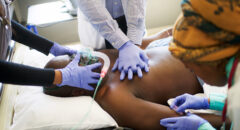
According to the American Heart Association (AHA), cardiovascular disease is the leading killer of new moms. This significantly impacts Black women, who are three to four times more likely to die from pregnancy-related causes than white women, according to the Centers for Disease Control and Prevention. While the statistics sound stark, there is hope.
For Marian Dancy, that hope started with taking charge of her own health.
In 2019, at 35 years old and six months postpartum with her fourth child, Dancy began experiencing symptoms that were initially easy to dismiss—fatigue, swelling, and intermittent eye issues.
As a busy working mom, she pushed through, attributing her symptoms to the demands of her lifestyle.
“I didn't think it was a huge issue…and I just kind of went on with my life,” Dancy shares.
As her symptoms worsened to the point where she experienced vision loss, Dancy decided to seek medical attention.
Despite multiple visits to different doctors, she was initially dismissed with no clear diagnosis.
RELATED: Heart Attack Survivor’s Second Chance at Life: “Listen to Your Body”
“I heard [you’re] young, you're healthy. That's really all I got from my appointment. There were no answers. I kept going but I was like OK I'm not feeling better than before so I scheduled another appointment to the doctor,” Dancy adds. “Again, I heard ‘Hey there's nothing in your history. It might be a little virus going around. Let's just keep an eye on it.’”
As Dancy’s condition became unbearable, she decided to go to the emergency room. Again, she was met with challenges.
“I received a misdiagnosis of pneumonia so I began treating myself… After that, I had a severe decline…I felt like I was dying,” Dancy says.
Determined to find the answers she sought, the busy mom decided to take a sick day from work and use her insurance card to obtain a referral for a new doctor.
The fourth time was the charm for Dancy whose fourth doctor was able to give her an accurate diagnosis of myocarditis, a condition that causes inflammation of the heart muscle. Dancy was also notified that the myocarditis had led to heart failure.
Understandably, the mother of four had an initial reaction of fear.
“I had family that I was taking care of and I was afraid because what I knew heart failure to be was something very very serious – something that I hadn't imagined for myself. Initially, it was fear, but then as I was admitted to the hospital and a treatment plan was put together for me, that fear turned into hope – it turned into I'm going to take charge,” Dancy adds.
The diagnosis prompted Dancy to take charge of her well-being, make significant lifestyle changes and prioritize her health in ways she hadn't before.
One of the most impactful changes Dancy made was involving her family in her journey to better health.
“I put in the work… I got my whole family involved and it changed my life ultimately for the better,” Dancy adds. It has become a blessing to not only change my life [and] change my habits, but get my kids involved [and] educate them to learn more about my condition and how to help others.”
Together, Dancy and her family have embraced a low-sodium diet, regular cardiovascular exercise, and activities focused on mental wellness, such as therapy and stress management. By including her children in these lifestyle changes, Dancy has not only improved her own health; but she's also set a positive example for her family.
“We journal, we draw, we do those running things, we do a lot more talking about our feelings just so we can navigate it,” Dancy shares.
In addition to the lifestyle changes, Dancy changed her mindset and began prioritizing herself.
“I make sure that I organize everything in a way that there's space for the things that I need to stay healthy for myself and my family,” Dancy says adding that she found a new job position that affords her the creativity and flexibility she needs as part of her wellness journey.
Looking back on her journey, Dancy's perspective on health and wellness has undergone a profound transformation. She now understands the critical importance of self-care and prioritizing her own well-being, which is why it was so important for her to join the American Heart Association’s (AHA) Go Red for Women® Movement.

"I'm super honored and proud to volunteer with Go Red for Women. Not only do they support and listen to me, allowing me to share my message, but I think it's important for the work they're doing—to educate, bring awareness, and show real women who are struggling with this,” Dancy says. “We have that relatability to other women out there, so they can maybe see what they can do to be preventative as far as heart health is concerned. Even when you're facing a diagnosis, like, 'Hey, these are women that have gone through something as well, and they're thriving. What can I do to learn more, to be well, and to spread the message?'"
Dancy's advice for other women
Drawing from her own experiences, Dancy offers valuable advice for women facing similar challenges:
- Get Educated: Understanding the signs and symptoms of potential health issues is crucial. Dancy encourages women to educate themselves about common postpartum symptoms and to seek medical advice if anything seems unusual or persistent.
- Advocate for Yourself: Dancy emphasizes the importance of advocating for your health. If you feel that something is not right, seek medical attention and push for further evaluation if necessary.
- Prioritize Self-Care: As a busy working mother, Dancy understands the challenges of balancing family and career. However, she stresses the need for women to prioritize their own well-being, both physically and mentally. Taking time for self-care is not selfish—it's essential for overall health.
- Stay Informed: Keeping up with regular check-ups and screenings is crucial for early detection of potential health issues. Dancy encourages women to stay informed about their health and to attend annual appointments with their healthcare providers.
Dancy also emphasizes the importance of learning hands-on CPR, especially for those who may come across someone in need of immediate medical assistance.
"Learning hands-on CPR is a small but significant way we can contribute to the well-being of our communities. It's about being prepared to take action in critical moments and potentially save lives,” she says.
RELATED: Rising Above: A Mom’s Journey to Beat Postpartum Hypertension
Warning signs to pay attention to
Recognizing the signs and symptoms of potential health issues is key to early intervention. Dancy also highlights the following warning signs that women should be aware of, especially after childbirth:
- Fatigue: Persistent fatigue that does not improve with rest could be a sign of an underlying health issue and should be investigated.
- Swelling: Unexplained swelling, particularly if it is severe or accompanied by other symptoms, should not be ignored.
- Vision Changes: Any sudden or unexplained changes in vision should be evaluated by a healthcare professional.
- Shortness of Breath: Difficulty breathing or shortness of breath, especially with minimal exertion, should be taken seriously.
- Chest Pain or Discomfort: Any chest pain or discomfort, especially if it is severe or prolonged, should prompt immediate medical attention.









